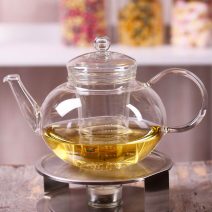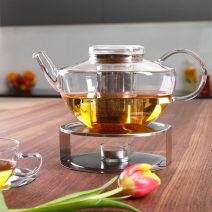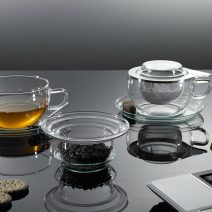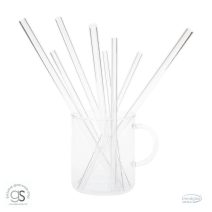Around tea - TrendglasJENA
If YOU are a tea lover, but even if you don't like tea, but for some reason you need to drink herbal tea, you've come to the right place. We have over 50 varieties of teapots alone, and over 25 varieties of cups to choose from. But we also have other kitchen jars. They all exist thanks to my partner's family, proven in over 55 countries, under the TrendglasJENA brand( around tea, coffee& more, kitchen and helpers).
The products are made in Hungary, in the German Jena quality, which means that the kettles, teapots and even the glasses can be put on an open flame and tea can be brewed without the water coming into contact with metal at all. In fact, our glass stirrers and glass straws can completely replace metal spoons or plastic/metal/paper straws.
What's more, most of our products are lego, so you can pick and choose the glass, filter and lid that you like, making a completely unique product. And if a part breaks, it can be reordered separately.
What determines the taste of your favourite tea?
It's not just the type of tea you choose that will determine how a cup of tea will taste. Even a first-harvest darjeeling will taste bad if it steeps in hot water for a long time, and even the most desirable teas will be undrinkable if they are made from chlorinated tap water.
What does it take to make good tea?
Choose a filtered tea, because I don't recommend filtered teas, as you can't be sure what the "tea grass" powder in them is.
Tap water is chlorinated almost everywhere, so it is not recommended. Instead, get filtered water, possibly well or spring water, which contains small amounts of minerals, no sodium chloride (salt), little lime, but quite a lot of trace elements, as it can alter the taste of the tea.
If you don't have well or filtered water, boil the water to soften the hard tap water and let it cool for 2-3 minutes. The tea leaves are very delicate, boiling water will burn them and take away the delicious aromas and flavours. The ideal temperature for tea water is between 80 and 90°C.
The boiling time:
You've probably heard that tea leaves contain both theine and tannin, but not many people know that it takes about two minutes for all the theine to release from the tea, while the tannin is released as long as the leaves are in contact with water. If you want your cup of tea to taste nice and good, you have to be very careful about how long you keep the leaves in the teapot after boiling, or how long you pour the tea off afterwards.
Try to stick to the brewing times below:
-Assam, Ceylon and Darjeeling black teas: 3-4 minutes
-Ceemun, Yunnan, Sichuan Chinese black teas: 3-4 minutes.
-Chinese green teas: 4-6 minutes
-Japanese green teas:1-3 minutes
-semi-fermented (oolong) green teas:1-7 minutes
BUT! Attention! General rule:
The smaller the leaves, or the more finely fragmented they are, the shorter the time recommended to leave them in the brew. E.g. a very finely ground tea should be left in the teacup or teapot for only 1 to 2 minutes, otherwise it will become bitter and undrinkable.
Premium quality tea leaves can be 'steeped' several times.




